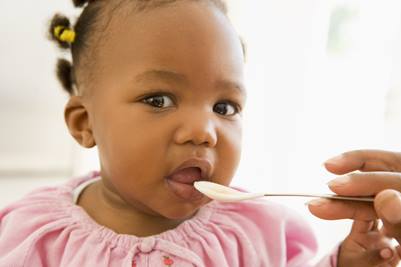How to introduce your baby to solid foods
It can be an exciting and messy time when it comes to introducing solid foods to young infants. With all the foods that are located on the market, it can be hard to figure out what your baby should be receiving. It also can be difficult to think about when to start them on this journey. Every parent is going to reach this milestone, and it is important to know what to look for when this time comes.
When should I start solid foods?
It is recommended that parents start to feed their children solid foods between the ages of 4 to 6 months old. Although this time frame is recommended, it is also important to look for signs from your baby to see if they are ready for this new adventure.
Signs your baby is ready to start solid foods:
- Able to sit up with assistance
- Child is able to maintain good head and neck control
- Opens their mouth and shows interest when food comes their way
- Child has doubled their birth weight
Which foods can I think about starting and which ones should I avoid?

When you plan to start introducing baby foods to your young infant, it is best to start them off with pureed foods that include only one ingredient at a time for at least 3 days before giving them a new food item. Certain vegetables and meats contain more iron, which is important for cells in our blood, which carry oxygen around our body. This is especially important in growing infants. Single grain cereals and fruits are excellent options as well.
Feed your baby using about half a spoonful initially to see how they react to this new food. If your child gives you their classic angry face or immediately spits it out and rejects it, don’t lose hope! You may continue to give them breast milk and formula in between to prevent them from getting frustrated with feeding. Avoid adding solid foods such as cereal into bottles because this may put your baby at risk of choking or cause improper weight gain. Remember, this should be an enjoyable experience for your child and they may have a slow transition into feeding.
When young kids are getting introduced to eating for the first time. It is best to avoid hard, round foods (ex. raw carrots and peanuts). These can cause them to choke and should be avoided. Honey is not recommended in babies because it may contain certain bacteria, which is very dangerous. Also remember, if you are buying jars of food, always check the label to see how it should be stored and the expiration date.
Does my baby have food allergies?
Food allergies can also be a concern for young babies and can sometimes be seen if a parent or sibling has the condition. Some signs and symptoms to look out for include a skin rash, facial swelling, wheezing, difficulty breathing, vomiting and diarrhea. If any of these symptoms present after introducing a new food item, immediately stop giving the child the food product and see your pediatrician for further guidance and assistance.
Why shouldn’t I introduce solid foods early?
Starting solid foods early may change the amount of calories your baby gets daily and may interfere with their ability to gain weight properly. Also, young babies must develop the muscles and correct coordination needed to chew, and introducing foods too soon may put them at risk for choking.
What changes can I expect when my baby starts solid foods?
Since your baby has started to change their diet, their stool will change as well with a difference in color, consistency and possibly smell. Your baby’s digestive system is still new and may take sometime to adapt to the introduction of different foods. If you notice frequent, loose, watery stools, blood in stool or fullness of your child’s stomach, consult your pediatrician.
How can I help my child develop good eating habits?
Mealtime is an excellent part of the day to spend with the whole family. Make sure not to overfeed your child and watch for cues that they are done eating. Starting healthy eating habits from the beginning will help your infant with their nutrition and development in the long run.






